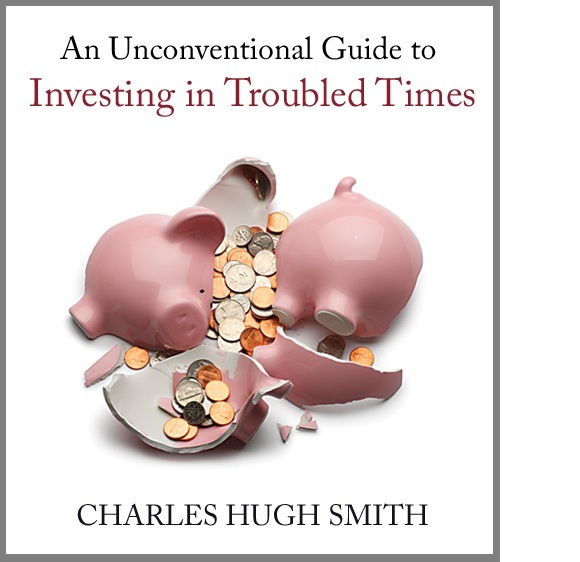Next In Line for Implosion: Pension Plans
Pension plans are based on 8% annual growth forever. What happens to these plans in a zero-interest rate world as the global economy and stock markets contract?
I'm afraid it's time for an intervention. I don't enjoy being the bearer of difficult news, but now that Europe has stumbled drunkenly into the pool and been "rescued," it's once again tearfully blubbering that this time it's all going to change, and a new prime minister in each dysfunctional, insolvent EU nation is going to make the pain and the addiction all go away.
It's time we face the reality that Europe and the U.S. are full-blown financial alcoholics, addicted to illusion and debt. And what do they turn to as "solutions"? The very sources of their pain: illusory "fixes" and more debt. Have you ever seen a global market as dependent on rumors of "magical fixes" for its "resilience" as this one?
What's truly remarkable is the psychotic distance between the facts--Europe's debts are impossible to service, its economy is free-falling into recession, the U.S. is already in recession, China's real estate bubble has popped and cannot be reinflated-- and the heady leap of global markets on every trivial rumor of a magic fix.
Since it runs in our family, I do not use the word "alcoholic" lightly. Those of you who have to deal with alcoholics know the drill: the liquor stashed behind the fridge, as if everyone doesn't know it's there; the stumbling into the pool, the humiliating rescue, the tearful promise of change which goes nowhere, and all the rest.
I seriously suspect the entire global economy is alcoholic--not about liquor, but about debt and the impossibility of paying entitlements which expand by 8% a year in an economy which grows by 2% a year at best. In all the millions of words printed about the subprime meltdown, the gutting of the U.S. financial and housing markets and now about Europe's impossible burden of debt, how often have we seen anyone in the MSM or mainstream financial press confess that "borrowing our way of out of trouble" is not just financially bankrupt but morally bankrupt as well?
Like a full-blown alcoholic, the people and governments of the U.S. and Europe stagger from debt source to debt source, weaving drunkenly between "stashes" of new debt in the Fed, Treasury and private sector markets. Despite the abject failure of the magical-thinking "fix" of becoming solvent by exponentially expanding debt, we see the same pathetic pattern repeating in Europe, where the apologists for the alcoholic debt-binge continue to claim the risk of systemic failure and collapse of asset values is low.
While everyone is focused on the drunk being pulled from the pool--Europe's sovereign debt--another drunk is teetering on the edge: public and private pension plans. Here's the reality in a nutshell: pension plans only work if they earn average returns of around 8% per year, basically forever.
Gripped by the mono-maniacal desperation of an addict who sees no other path but another hit, central banks have lowered interest rates to near-zero to "spark growth." Unfortunately the only thing being goosed is the future cost of servicing the additional debt.
How do you earn 8% on money which yields at best 3%? You can't. How do you reap a gain on bonds when interest rates have already hit bottom and can't fall any lower? You can't.
Which leaves the stock market as the only hope for pension plans. Since the bottom in March 2009, central banks engineered a "magic solution" that generated fantastic stock market returns: by constantly lowering interest rates and increasing liquidity, central banks force-fed stock markets with demand (there was no other place to get a fat return) and the see-saw of interest rates and "risk-on" equity markets: as rates decline, equities floated ever higher.
Now that rates are near-zero, then the central banks are pushing on a string: there is no "magic" left to juice equity markets.
The equity markets are in effect living on vitamin C and cocaine: rumors of new "magic fixes" and the hit of central bank infusions.
Once rumor is no longer enough to float markets higher, then the consequences of depending on stock market returns will hit pensions with a terminal case of the DTs.
The "magic" of ramping up debt to create the illusion of a healthy economy only works once. The "fix" "worked" from 2009 to 2011, but now the high is wearing off. The next round of rumor and debt expansion won't even create the illusion of growth, as the global economy is already careening back into the contraction that trillions in new debt staved off for three years.
I have covered the disconnect between the promises of 8% yields forever built into public pension plans and a slow-growth/no-growth economy many times:
Yes, There Will Be Armageddon: Government Goes Bankrupt (July 24, 2008)
How the Fed Pushed the Nation's Pension Plans--and Local Government--into Insolvency(May 24, 2010)
Public Pension and Healthcare Costs and Financial Common Sense (February 28, 2011)
Every once in a while an MSM outlet addresses the issue directly, for example:
Pension issue balloons with soaring costs (S.F. Chronicle):
Pension costs are soaring to $800 million, tripling during the last decade, as Los Angeles faces years of projected budget deficits even with deep cuts in services and staff.
The main driver of higher pension costs is the stock market crash. CalPERS (California's primary public pension plan) gets about 75 percent of its revenue from investment earnings. Its portfolio peaked at $260 billion in 2007, fell to $160 billion last year and now is about $204 billion.
Why economic growth isn't enough to fix budgets:
But under the laws now dominating government budgets, many expenditures essentially are or will be growing faster than both revenues and the rest of the economy. In fact, in many areas of the budget, automatic expenditure growth matches or outstrips revenue growth under almost any conceivable rate of economic growth.
Now, so much spending growth is built into permanent or mandatory programs that they essentially absorb much or all revenue growth. Meanwhile, we've also cut taxes, widening the gap between available revenues and growing spending levels.
Consider government retirement programs. Most are effectively "wage-indexed" insofar as a 10 percent higher growth rate of wages doesn't just raise taxes on those wages, it also raises the annual benefits of all future retirees by 10 percent. Meanwhile, in most retirement systems, employees stop working at fixed ages, even though for decades Americans have been living longer.
Today, so much of government spending is devoted to health and retirement programs that their growing costs tend to swamp gains we might achieve in holding down the ever-smaller portion of the budget devoted to discretionary spending. Still other programs add to the problem, such as tax subsidies for employee benefits, the cost of which grows automatically without any new legislation.
In other words, the entire system of state and local government is now based on the same 8% "permanent high growth" of the 1990s speculative market. Funding increases are wired in, regardless of how much tax revenues fall. That is a recipe for insolvency.
Now we get to the heart of the matter. Which institution engineered the heady stock market bubble of the 1990s that created the illusion of "permanent high returns" and growth of tax receipts? The Federal Reserve. Which institution has made the stock market the proxy for the economy? The Federal Reserve. Which institution has engineered a three-year stock market rally to put off the inevitable implosion of pension plans, entitlements and tax revenues that must grow by 8% annually while the real economy is flat-lined? The Federal Reserve.
We can ask the same questions of Europe and get the same answer there, too: the European Central Bank (ECB).
Addiction is a terrible disease, founded on the illusion that the pain of facing reality can be put off forever by dulling the pain of addiction itself with ever-higher doses of self-destruction. We are witnessing the self-destruction of economies and machines of governance that have chosen denial, illusion, rumor and magical thinking over facing reality. The drunk has been pulled from the pool once again, slobbering self-piteously and promising to really, really change tomorrow, and we believe the lie, at least until morning, because hope is so much easier than reality.
If this recession strikes you as different from previous downturns, you might be interested in my new book An Unconventional Guide to Investing in Troubled Times (print edition) or Kindle ebook format. You can read the ebook on any computer, smart phone, iPad, etc.Click here for links to Kindle apps and Chapter One. The solution in one word: Localism.
My Big Island Girl (song)
Buy from CDBaby or amazon.com (99-cent MP3 download)
Readers forum: DailyJava.net.
Order Survival+: Structuring Prosperity for Yourself and the Nation (free bits) (Mobi ebook) (Kindle) or Survival+ The Primer (Kindle) or Weblogs & New Media: Marketing in Crisis (free bits) (Kindle) or from your local bookseller.
Of Two Minds Kindle edition: Of Two Minds blog-Kindle

























